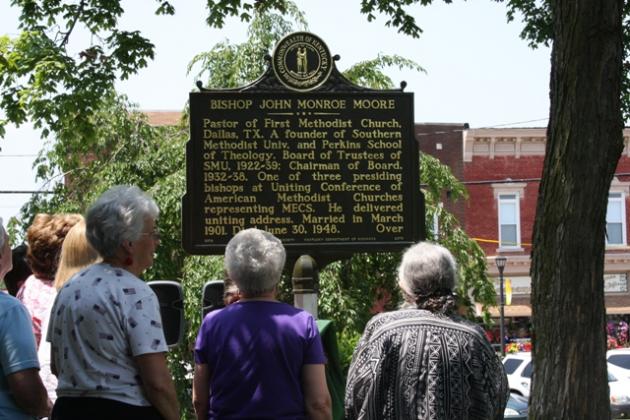Historical Marker Honors Bishop John Monroe Moore
A large group gathered on the courthouse lawn on Saturday for the unveiling and dedication of a historical marker for Bishop John Monroe Moore. Grady Roger Givens, Butler County Historical Marker Chairman, welcomed the group.
“This has been a long time dream of mine since I wrote about Bishop Moore in 1984,” said Givens.
The invocation was given by the Reverend Gary Chapman, representative of the Kentucky Conference of United Methodist Church. Chapman called Moore one of the most influential individuals in the reunification of the Methodist Church.
“I am so glad I got to be a part of this and that everybody is here,” said Joyce Porter Hammers, chairman of John M. Moore Historical Committee, as she introduced the keynote speaker, Patrick Jennings.
Patrick Jennings, Managing Partner of Commonwealth Alliances, Washington, D.C., was asked by his pastor in Louisville to speak about the impact of the Civil War on the Methodist Church. The Methodist Church split over disagreements over slavery.
“My pastor knew I loved history,” said Jennings.
According to Jennings he learned of Bishop Moore, his role in the reunification of the church and his roots in Butler County, while doing research. Bishop Moore delivered the uniting address at the 1939 UMC Conference.
John Monroe Moore, born in Butler County on January 27, 1867, son of Joseph Alexander and Martha Ann (Hampton) Moore. John married Miss Bessie Harris of San Antonio, Texas, 25 March 1901.
Moore was educated at the Morgantown High School and earned the A.B. degree from Lebanon College in Ohio in 1887. In 1890, Moore was one of the founding professors of Texas Normal College, the forerunner to the University of North Texas. While there, he taught engineering and mathematics. He also taught voice and harmony in the college's Conservatory of Music. After leaving his post, he continued his studies at the Universities of Leipzig and Heidelberg in Germany. He earned the Ph.D. degree at Yale University in 1895.
Rev. Moore was licensed to preach in 1887. He was admitted on trial by the St. Louis Annual Conference in 1895, when he was also appointed the Pastor of the Marvin Memorial Methodist Church in St. Louis, serving until 1898.
In 1906 Rev. Moore became the Managing Editor of The Daily Christian Advocate , an important Methodist periodical of that day. He had previously been a member of the staff of the St. Louis Christian Advocate and of the Texas Christian Advocate. Rev. Moore returned to St. Louis in 1909 as Pastor of St. John's M.E.S. Church. However, in 1910 he was elected Secretary of the Department of Home Missions of his denomination.
The Rev. John Monroe Moore served his denomination as a member of the Joint Committee on Editing for the 1905 Methodist Hymnal. He was a member of the Federal Council of Methodism, and of the Committees on Evangelism and on Church and Country Life of the Federal Council of Churches of Christ. He was on the Executive Committee of the Home Missionary Council of his denomination. He also served in the Southern Society for Philosophy and Psychology.
The Rev. Dr. John Monroe Moore was elected a Bishop of the Methodist Episcopal Church, South, at the General Conference of 1918. He was assigned the work of the M.E. Church, South in Brazil. Bishop Moore served in East Texas, Oklahoma, West Texas, New Mexico, Georgia, Florida, Missouri, and Arkansas. He retired from the active episcopacy in 1938, and died in Dallas on July 30, 1948.
Georgia Lavern Romans, Regent of Butler County D.A.R. Chapter and members assisted in the unveiling of the marker.
David Hunt, choir director of Faith United Methodist Church in Bowling Green, sang “Oh, For a Thousand Tongues. A reception followed the dedication ceremony inside the courthouse.
Funding for the project was provided by Sam and Helen Moore, Michael and Katherine Jennings, Butch and Margaret Childers, Loretta Moore Nelson, John and Betty Higgins, and Jack Miller.
The Butler County Historical Marker Committee offered a special thanks to Butler County DAR, Butler County Fiscal Court, Brenda Longhoffer, Mike Hancock, Secretary Kentucky Transportation Cabinet, and Kent Whitworth, Executive Director Kentucky Historical Society Tourism, Arts and Heritage Cabinet.
- Log in to post comments



























